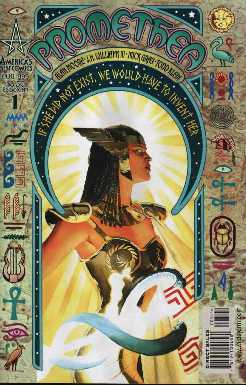 "Promethea"
- 6 March, 2001
"Promethea"
- 6 March, 2001
 "Promethea"
- 6 March, 2001
"Promethea"
- 6 March, 2001
One of the creators who keeps coming to the top of my must read list is Alan Moore. I have admired his work from the first time I read "Watchmen", through "V for Vendetta", "Swamp Thing" and "From Hell"....I like his good stuff so much that I even forgave him for working with Rob Liefeld on "Supreme".
Currently, his main body of work is "America's Best Comics", a group of titles for DC Comics. One of them, "Tom Strong", has previously been written about in this column (find it in the archives). No less impressive have been his other offerings, "Top 10", "The League of Extraordinary Gentlemen", "Tomorrow Stories", and the subject of the current column, "Promethea".
I was lukewarm on "Promethea" at first. The seemingly offhand mixture of superheroics and magic didn't have the depth of theme or character that I enjoy finding in Moore's work. Oh, sure the art by J. H. Williams III and Mick Gray was attractive and imaginative, and I suspect that Moore's grocery list would make more interesting reading than some writers to whom I've been exposed, but overall the book seemed to lack the same panache of the other offerings from ABC. However, my rule is to give a book a fair chance, and so I have stuck with "Promethea"....Now, I must admit, I have made a wise decision.
I have discovered that the Wonder Woman style trappings of the heroine bely the true intentions of the series. What we're getting here is an education in magic. I remember reading in some recent issues of "Cerebus" a fax interview between Moore and Dave Sim, in which Moore discussed his practice and theory of magic (that would be issues 217-220 if you're interested in reading it). Although I do not support the mystical aspect of magic, I do think there is some merit in its theory when the non-rational language is stripped from it. So, to discover this new aspect to one of my favorite writers was stimulating, especially as it gave me a new light by which to reread and analyze his work. Later issues of "Promethea" have shown that Moore is only using this super-heroine paradigm as a framework in which to discuss that philosophy which he practices. Recent issues have had the protagonist spending less time in confrontational settings, and more time exploring her own nature as a feminine and/or magical being. In issue 10, "Sex, Stars & Serpents", for example, he casts aside the T&A perspectives on female superheroes to take a look at sex from a magical and metaphorical point of view, changing the end result from cheap titillation to illumination. I can see that the sex aspect could be used as a draw for the typical adolescent audience, who are for once delivered something far more than what they paid for. This smacks not only of creative brilliance, but marketing genius.
The most recent issue of "Promethea" I have read is issue 12, "The Magic Theatre", cover-billed as "A Pop Art Happening". This is, I think, the high point for the series to date. The premise is apparently simple: Promethea has the tarot explained to her by her caduceus (known to her as "Mike and Mack"), while Aleister Crowley does a standup routine in the background (sounds like something from a Douglas Adams novel, doesn't it?). Only, as Promethea learns, so too is the reader given instruction. The twin serpents' poetic interpretation of the deck is counterpointed by Promethea's more pragmatic attempts to understand the information being given to her. Meanwhile, we notice that Crowley is aging and eventually dying during the telling of his joke, the text of which interweaves itself in Promethea's understanding of the Tarot, forcing new insight into the relationship between knowledge, illusion and reality. The end result for me (so far) has been to realize that Moore, our modern day Mr. Crowley, is discussing magic as "a coded history of ...everything" (to quote Promethea), as a metaphorical analysis of knowledge using symobology to relate complex concepts to the receiver. In a similar way, the very medium of comics uses symbols and conventions to attempt to relate complex ideas to the readers, or myths and religions of any stripe can be divorced from their literal doctrines to be viewed as metaphorical, symbolic interpretations of life, reality and knowledge. Pretty heady stuff for a single, simple comic book, no?
Not to beat a dead horse with this theme, but the symbolic nature of myth and magic is further elucidated in the art of Williams and Gray, whose visual interpretation of the tarot are highly stylized and cartoonish, calling to mind for the the Scott McCloud discussion of the universal identification factor inherent in the simplicity of cartoon art (see "Understanding Comics" for a more detailled explanation of this idea). Meanwhile, Scrabble tiles in the foreground are busy making anagrams of "Promethea", with the first result being "Metaphore". The final success of this issue on all levels is apparently indicative of a creative partnership to surpass that which produced "Watchmen".
Of course, all that is from one reading of the issue. I will probably have to reread it a couple of times to fully understand it. But don't take my word for it...go buy a copy and see for yourself.
And don't forget to read it on the bus.
Return to the "Comics to Read on the Bus" Archives here.